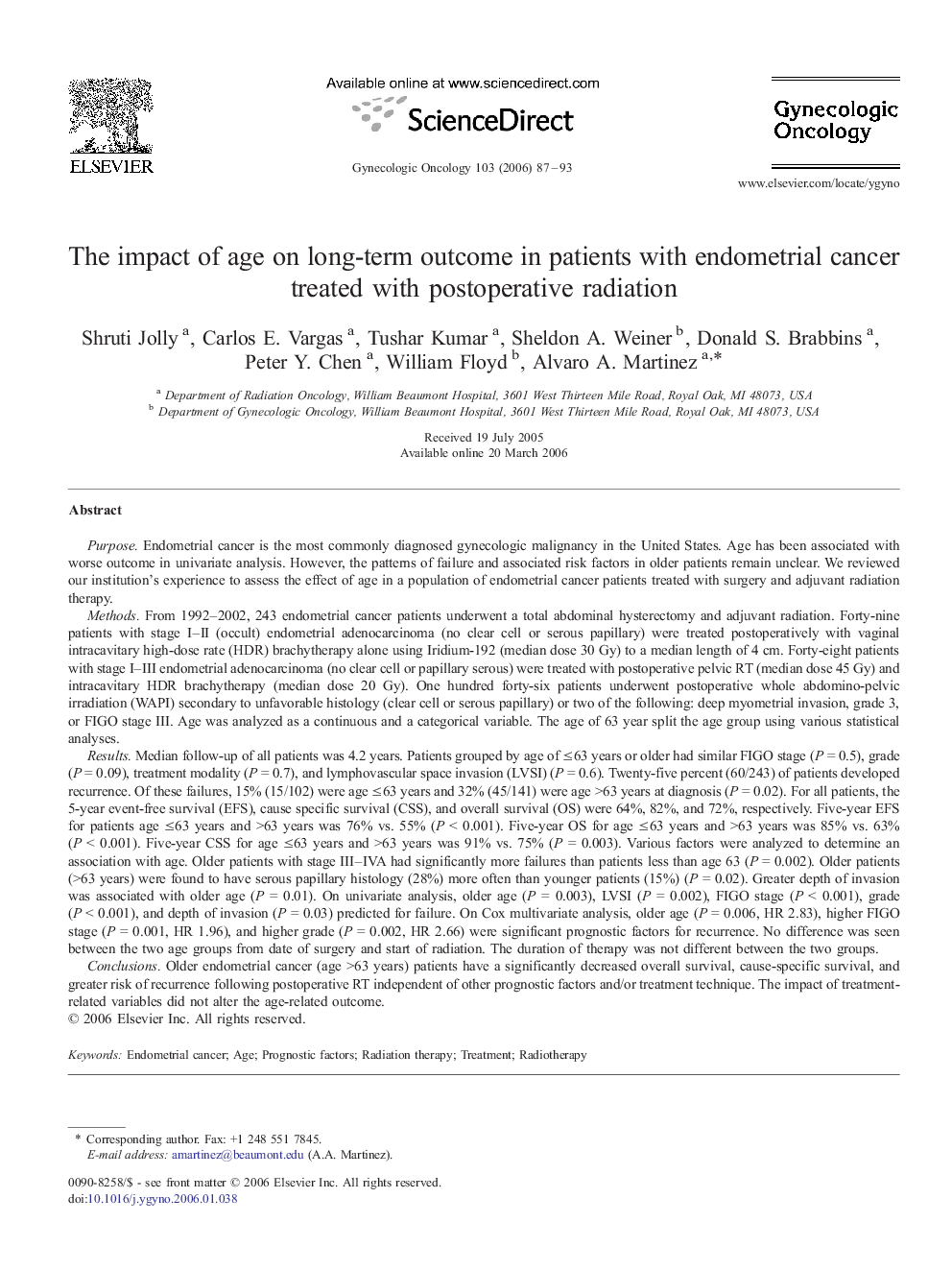| کد مقاله | کد نشریه | سال انتشار | مقاله انگلیسی | نسخه تمام متن |
|---|---|---|---|---|
| 3946581 | 1254348 | 2006 | 7 صفحه PDF | دانلود رایگان |

Purpose.Endometrial cancer is the most commonly diagnosed gynecologic malignancy in the United States. Age has been associated with worse outcome in univariate analysis. However, the patterns of failure and associated risk factors in older patients remain unclear. We reviewed our institution's experience to assess the effect of age in a population of endometrial cancer patients treated with surgery and adjuvant radiation therapy.Methods.From 1992–2002, 243 endometrial cancer patients underwent a total abdominal hysterectomy and adjuvant radiation. Forty-nine patients with stage I–II (occult) endometrial adenocarcinoma (no clear cell or serous papillary) were treated postoperatively with vaginal intracavitary high-dose rate (HDR) brachytherapy alone using Iridium-192 (median dose 30 Gy) to a median length of 4 cm. Forty-eight patients with stage I–III endometrial adenocarcinoma (no clear cell or papillary serous) were treated with postoperative pelvic RT (median dose 45 Gy) and intracavitary HDR brachytherapy (median dose 20 Gy). One hundred forty-six patients underwent postoperative whole abdomino-pelvic irradiation (WAPI) secondary to unfavorable histology (clear cell or serous papillary) or two of the following: deep myometrial invasion, grade 3, or FIGO stage III. Age was analyzed as a continuous and a categorical variable. The age of 63 year split the age group using various statistical analyses.Results.Median follow-up of all patients was 4.2 years. Patients grouped by age of ≤63 years or older had similar FIGO stage (P = 0.5), grade (P = 0.09), treatment modality (P = 0.7), and lymphovascular space invasion (LVSI) (P = 0.6). Twenty-five percent (60/243) of patients developed recurrence. Of these failures, 15% (15/102) were age ≤63 years and 32% (45/141) were age >63 years at diagnosis (P = 0.02). For all patients, the 5-year event-free survival (EFS), cause specific survival (CSS), and overall survival (OS) were 64%, 82%, and 72%, respectively. Five-year EFS for patients age ≤63 years and >63 years was 76% vs. 55% (P < 0.001). Five-year OS for age ≤63 years and >63 years was 85% vs. 63% (P < 0.001). Five-year CSS for age ≤63 years and >63 years was 91% vs. 75% (P = 0.003). Various factors were analyzed to determine an association with age. Older patients with stage III–IVA had significantly more failures than patients less than age 63 (P = 0.002). Older patients (>63 years) were found to have serous papillary histology (28%) more often than younger patients (15%) (P = 0.02). Greater depth of invasion was associated with older age (P = 0.01). On univariate analysis, older age (P = 0.003), LVSI (P = 0.002), FIGO stage (P < 0.001), grade (P < 0.001), and depth of invasion (P = 0.03) predicted for failure. On Cox multivariate analysis, older age (P = 0.006, HR 2.83), higher FIGO stage (P = 0.001, HR 1.96), and higher grade (P = 0.002, HR 2.66) were significant prognostic factors for recurrence. No difference was seen between the two age groups from date of surgery and start of radiation. The duration of therapy was not different between the two groups.Conclusions.Older endometrial cancer (age >63 years) patients have a significantly decreased overall survival, cause-specific survival, and greater risk of recurrence following postoperative RT independent of other prognostic factors and/or treatment technique. The impact of treatment-related variables did not alter the age-related outcome.
Journal: Gynecologic Oncology - Volume 103, Issue 1, October 2006, Pages 87–93